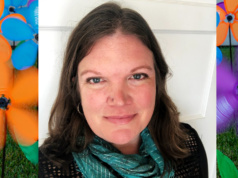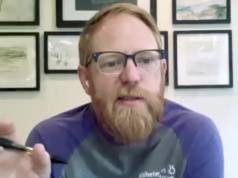Families have noticed an escalation of Alzheimer’s and dementia symptoms after having been separated from senior loved ones for so long during the pandemic. This hour with Dementia expert Faith Marshall of Awakenings Hypnosis & Coaching deals with how to communicate with loved ones facing Alzheimer’s and dementia. This segment provides a background into the mind of someone who has Alzheimer’s, and how to maintain the respect of our loved ones in the face of frustration and a lack of understanding.
Well, that’s a hard task! So I think that it starts with the label of a diagnosis and when a when a patient is diagnosed, every one is confused and every one is in fear and we somehow detach the person from the diagnosis and we’re dealing with. You know that label of dementia and Alzheimer’s, and that’s where most of the, most of families’ questions come from right. So what we need to remember is just like you went to the grocery store and you just forgot your list, and so then you couldn’t remember what was on your list? It doesn’t change who you are. -No, it does not. -You just forgot right and what I see happening is we start to deal with them because of our own emotions being on that roller coaster. That just happens.
Naturally, we start to detach from the person right. So what is really best is remembering who the person is and in meeting them there and you- and I have talked about this meeting the patient, where they are right right, if you think of it from a perspective of that person is just forgetting they’re, not right or not in charge of you know, making these choices that they’re, forgetting something it’s just happening. Just I think you forget your grocery list exactly well and I think also there’s a perception with the the individual that has all simmer ship dimensio, that they’re not being forget them, that they remember things differently and it isn’t that they’re rewriting history intentionally. It’s the fact that how the synapses is not just is not connecting in a normal way, so it, like you, said their individuality who they are, what they like. What they dislike never goes away, and I think one of the things that we as families need to remember is: What is it that we can do to make sure that we always honor the things that are most important to them? And I think that is you know, maybe in the early stages we tart start talking to them about. You know little things like – I remember, I’ve talked to another dementia consultant a long time ago – and they talked about the fact that how many times does a senior going to a memory care unit and they don’t know how they took their coffee. You know, maybe they would like coffee in the morning, but they like two lumps of sugar. Instead of no sugar, you know- and it’s not necessarily – we may think that that’s an unusual thing, but I think one of the things that is really important for families to do right up front is to make sure that we’re on the same page of what are our loved ones likes and dislikes.
You know do and, and how many covers do they like on their bed, because there will come a day likely that they won’t be able to speak for themselves, and I say something that best thing that we can do is family members is to honor that, and so you know a lot of what you’re saying is absolutely accurate yeah and thank you for bringing that up. There’s an excellent book called The Memory Keeper . – I love it. – I can’t remember the author off the top of my head -Della Street. -Yes, it’s great way for people ahead of time to. I gave a copy of that book to my friend who had cancer, who wanted her grandson to remember her, so she could write down answer all those questions of the things that important know who she was, and so it has. It has many more uses than just dementia, but it’s like a journaling prompt, and it asks questions that you don’t think to tell someone. And like you said, so, if you, if you’re in an environment- and you like your coffee with two creams and one sugar, and they give you black coffee, you just don’t want it, but you can’t tell them why you don’t even know why no just doesn’t taste right right so person, centered care is the key here for trying our best to help help the patient feel as normal as we can help them feel.
We need to put ourselves aside and focus on them and giving them choices that are choices that they would. You know like to make and either or I’ve said many times it’s like dealing with the five year old. You know, if you want to do you want to go to lunch or do you want to play in the park? Yeah emphasize the one that you want them to do. It would take a shower before we go out to lunch, or do you want to eat here, yeah and and in a way it’s you know you you’re you’re in charge, but you’re, allowing them to feel like they’re in charge. Well and it’s you comes right down to the mindset of allowing them and honoring them with with dignity. It’s like they are a full person, whether they’re in no matter what stage they are in and- and that is one of the things that I think a lot of times. Families get frustrated not because they don’t love their loved one because they do, but they feel like they’re in a scenario where they are so frustrated, trying to communicate that it can come out as frustration or anger towards that person, and it’s not it’s just the fact that that person doesn’t have the synapses connectors in their brain to be able to process what you’re telling them.
And so you know, I always say to families it’s like if you get feel a sense of frustration, leave the scenario I remember taking care of my mom and I would walk around the block. She was in a skilled nursing facility, but she had dementia and she would say things she still knew how to push my buttons. Even when she was more advanced, she would say things. Sometimes it would just you know I could just feel the blood boil. You know because she was pushing my buttons and I had to learn to take a breath and say mom, I’m going to. I have to run a quick ear and I’ll be right back and then I d dealt with my issues later. I had to realize that you know I had to move out of this mindset and to go on a walk to get. You know, release your Situa. You know yourself from the situation. Even if it’s a you know around the block to you know to laugh or to move. It is such an important part of making sure that we as families stay centered through this process. So I’m glad you brought that up, because something else that happens that most of us aren’t aware of at the time is when something triggers us. Our energy changes. Our whole energy field, changes and pets always react to that. Most of us have experience with pets, not understanding why we’re tense. You know what’s happening, and then they start following you around well for humans. We try to you, know, step back so you’re, trying to accomplish something with a person and you’re trying to force them into doing something. It doesn’t at that point. What you’re saying isn’t what matters most? It’s your energy, so taking a walk, walking outside breathing. Whatever can help you get back to having that loving heart that is the most co operative energy to be in then their response will be better right and folk and, focusing on them and realizing you’re- Putting yourself aside, it’s not time for me to deal with my emotions, like you were saying it’s time it’s time for us to- You know, figure out how to get mom in the shower or how to help her understand. You know that this is what she needs to wear now. Mom didn’t like wearing pants that didn’t sip up, but pants that zipped up were not conducive to that environment right to changing her to elastic waste. Pants and leggings was a shift for her because she in her mind she was still in corporate America.
You know dressing up for work and she was still going to work in the nursing home, but but with that pin- and it’s all about perception- and I think one of the things that we need to think about in this hour is- is kind of some key things to remember, and I think one of the things that I would love to close out the segment with Faith is, I always, there’s a little book out there called The Four Agreements, and I don’t know if you’ve ever heard of it -Yes, I have it yes, -but one of the things it one of my favorite books of all- and it’s truly, I would say one of the best books for family caregivers, because one of the things of the four is take nothing personally. It’s like this is not a personal thing towards you and and so understanding that you’re just on different wavelengths and how to come and fill the bridge.
I think one of the things I would love to talk about the next segment is: What are some key points that we can look at as we move forward in. You know communicating with the love one. What do you think about that? I think that’s great. That would be great, and so everyone again Faith is here. We are talking again about communicating with someone with Alzheimer’s and dementia, and how can you be a better communicator and also take care of yourself in the process, so Faith will be right back, right after this. Thank you, Suzanne.
We would like to thank you for joining us in this podcast. Faith is here to support you and your family on this journey. She will help you to come together in harmony, creating the best team and advocating for your loved one’s care, so call Faith at 855-563-2484 to receive a $200 gift card just by mentioning that you’ve heard these podcasts. Again, that number is 855-563-2484.











